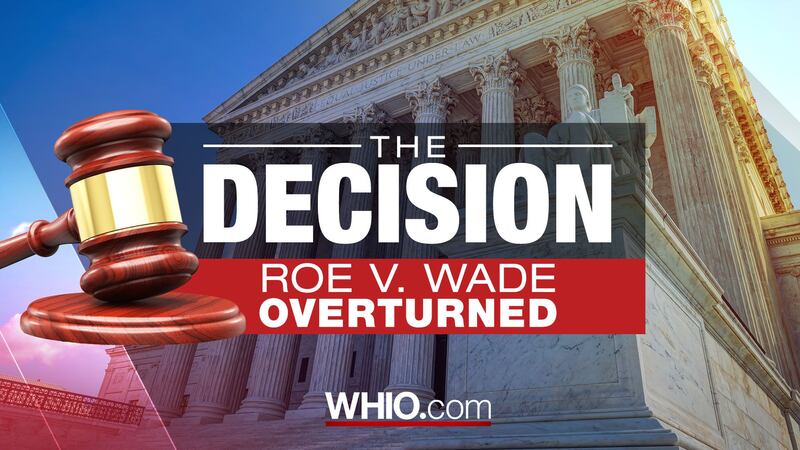DAYTON — UPDATE @6:45 p.m.
Ohio Attorney General Dave Yost announced Friday evening on Twitter that Ohio’s, “Heartbeat Bill is now the law.”
The Heartbeat Bill is now the law. pic.twitter.com/ipO9fMQ4H0
— Attorney General Dave Yost (@DaveYostOH) June 24, 2022
Yost added that the injunction blocking Ohio’s Heartbeat bill has been dissolved.
The injunction blocking Ohio’s heartbeat bill has been dissolved: https://t.co/HWUo5c5EJb
— Ohio Attorney General Dave Yost (@OhioAG) June 24, 2022
The ACLU of Ohio said in a statement Friday that the fight is not over.
“We will continue to everything possible to ensure that people can control their own medical decisions,” said Celina Coming, communications manager.
UPDATE @ 2:05 p.m.
Ohio Attorney General Dave Yost filed a motion in federal court less than an hour after the Supreme Court overturned the landmark Roe v. Wade decision, seeking to have legal injunctions removed on Ohio’s “Heartbeat Bill.”
>>LIVE UPDATES: Supreme Court overturns Roe v. Wade
Lawmakers passed the “Heartbeat Bill” and it was signed into law in 2019. However, the enactment of the law was postponed while legal challenges were still being sorted out, Mark Caleb Smith, professor of political science at Cedarville told News Center 7.
>>Ohio Right to Life: ‘we joyfully celebrate the announcement from the Supreme Court;’
Smith said Yost had the ability to act quickly to file a motion in federal court to remove the legal hold-ups to have the state’s “Heartbeat Bill” officially become law.
>>’Dark day for our country;’ Ohio Planned Parenthood leaders react to overturn of Roe v. Wade
“Ohio does have the heartbeat bill on judicial standby. That was stayed temporarily because of these other legal maneuvers. The attorney general has the ability to have that lifted, now that Roe v. Wade is overturned. I think the immediate outcome will be the heartbeat bill becomes law in Ohio,” Smith said.
In a tweet, Yost said a motion was filed to have the injunction removed.
>>LIVE UPDATES: Supreme Court overturns Roe v. Wade
“BREAKING: We filed a motion in federal court moments ago to dissolve the injunction against Ohio’s Heartbeat Law, which had been based on the the now-overruled precedents of Roe and Casey,” Yost said in the tweet.
>>Roe v. Wade overturned: Which states will ban abortion; where will they remain legal?
Ohio’s “Heartbeat Bill” outlaws abortions after six weeks, which is after a fetal heartbeat can be detected.
BREAKING: We filed a motion in federal court moments ago to dissolve the injunction against Ohio’s Heartbeat Law, which had been based on the the now-overruled precedents of Roe and Casey. pic.twitter.com/4TTYv8jeU2
— Attorney General Dave Yost (@DaveYostOH) June 24, 2022
FIRST REPORT
The landmark ruling released by the Supreme Court Friday in the case of Dobbs v. Jackson Women’s Health Organization has overturned the 1973 opinion in Roe v. Wade.
The ruling by the Supreme Court now allows for individual states to make decisions on abortions, whether to allow abortions to continue, or to ban them.
News Center 7 spoke with two political experts Friday, Mark Caleb Smith, professor of political science at Cedarville and Christopher Devine, associate professor at the University of Dayton about what this decision means for Ohio.
Smith noted the biggest change will be in the pending “Heartbeat Bill” that is on judicial standby while the SCOTUS decisions were being sorted out, including the ruling on Dobbs v. Jackson Women’s Health Organization that was decided today. Ohio’s Heartbeat Bill would ban abortions after a fetal heartbeat can be detected, which is around 6 to 8 weeks.
“Ohio does have the heartbeat bill on judicial standby. That was stayed temporarily because of these other legal maneuvers. The attorney general has the ability to have that lifted, now that Roe v. Wade is overturned. I think the immediate outcome will be the heartbeat bill becomes law in Ohio,” Smith said.
While Ohio has the Heartbeat Bill on standby, other states have trigger laws in effect that enact other harsher abortion restrictions, Smith said.
“The bigger headline for nationwide including Ohio is that its up to us now. The federal government is not going to give guidance on this, outside of any new legislation or new rulings,” Devine said.
Devine added the questions will be if the Ohio legislature goes any further to ban abortions.
The next question comes into the speed in which Ohio acts, Smith said. Ohio Attorney General Dave Yost can file to have the Heartbeat Bill placed into law now that the legal holdup has been removed for the bill to become law in Ohio.
“Depending on speed in which the Attorney General acts, the change could be fairly immediate, frankly. That’s different than saying they would enforce it immediately, that they might not consider some kind of provision to delay this so people can begin to make decisions,” Smith said.
“I don’t think people should assume that things are they have been for any time into the future. I think there’s a real chance they could act quickly,” Smith added.
“It’s like the dam burst. Looks like Ohio is going to cut 14 weeks off the process,” Devine said.
“I think the Ohio General Assembly is going to move, now that the legal environment is clearer, they’ll have more guidance to make their own decisions. In some ways its a little unpredictable. Often these laws are passed to be challenged, but now there’s skin in the game. This law is going to go into effect and you may have blowback in election season based on how severe this law is, or is not,” Smith said.
This story will continue to be updated.
©2022 Cox Media Group






